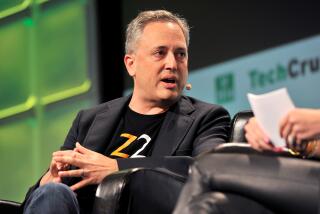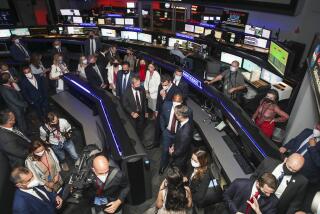Gore Comes Bearing Gifts--Pledges of Aid
- Share via
SAN FRANCISCO — Silicon Valley always welcomes visits from Vice President Al Gore, who, more than any other national politician, has cultivated close ties to the high-tech community.
The valley likes it even better when he comes bearing gifts, as he did during a two-day stop last week.
On Thursday, he visited San Francisco-based biotech firm Genentech, where he pledged the Clinton administration’s continued support of a policy that allows companies to apply some of their research costs against their taxes, a credit potentially worth billions of dollars nationwide.
On Friday, at the San Francisco airport, Gore promised $100 million in Federal Aviation Administration funding for the purchase of bomb-detection devices used by airports.
That gesture was received with particular glee by a Newark, Calif.-based company called InVision Technologies, maker of the only bomb-detection device so far to win FAA approval.
InVision’s device combines X-ray and medical CT scan technology to display a bag’s contents on color monitors, with threatening materials outlined in red, metals and electronics in blue and detonators in green. The devices look for densities and shapes of common explosive materials, from gunpowder to plastics.
When the FAA spent $140 million on explosive-detection programs and systems several years ago, InVision pocketed $52 million of that, and the company expects to do well in the new round.
“We’re pretty sure we’re going to get some of it,” said Sergio Magistri, chief executive of the 8-year-old company.
Los Angeles International Airport uses two of the devices. San Francisco International has been using one for the last two years. It’s placed in the airport’s international terminal, where it scans luggage being loaded onto planes bound for foreign destinations.
*
The device is as big as a minivan, costs $1 million and can scan up to 400 bags an hour.
“We could use several more,” said airport spokesman Ron Wilson.
During the vice president’s visit, he also viewed demonstrations of other safety systems, including a robot used by San Francisco police to pick up a suspicious package, load it into a protective trailer and haul it away.
But Wilson said one of the most effective means of bomb prevention is rather low-tech.
“We have eight dog teams and they do a good job,” Wilson said. “They’re trained to sniff out plastic explosives. Unlike a piece of equipment, you can even bring them on board a plane.”
More to Read
Sign up for Essential California
The most important California stories and recommendations in your inbox every morning.
You may occasionally receive promotional content from the Los Angeles Times.












